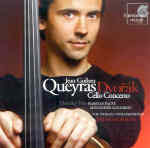This new recording of Dvorák’s Cello Concerto is glorious, and so different from the numerous others available that it more than justifies the inevitable duplication. Jean-Guihen Queyras is a supremely gifted performer seemingly incapable of making an unattractive noise: no mean feat on an instrument that, particularly in double-stops, routinely sounds like a dying cow. Aside from a beautiful tone and dead-accurate intonation, Queyras phrases the music with keen attention to dynamics and an impressive awareness of what the rest of the orchestra is doing. In the first movement, his unfolding of the second subject is exquisite. The Adagio’s central episode has passion aplenty, and sadness–but it never turns maudlin, and Queyras’ vibrato always is expressive rather than excessive. He brings plenty of virility to the finale’s opening march, then relaxes into a flowing coda that is serenity incarnate. In short, this is as fine an account of the solo part as you will hear anywhere.
What makes this performance even more special is the contribution of the Prague Philharmonia under Belohlávek. As you may know, this is basically a chamber orchestra, and that means an unusual lightness of texture, even during the big tuttis with trombones and tuba. In compensation, Belohlávek offers an extra dose of rhythmic snap and an entirely appropriate focus on the contribution of the woodwinds, which play magnificently and have the lion’s share of work to do in cooperation with the cello. Looking at the score, it’s amazing how many pages go by without violins (virtually the entire recap of the Adagio’s main theme, for example), and thanks to a beautifully balanced recording, Queyras and the orchestra truly interact as equal partners in the music’s ongoing dialog. The result has a freshness, poetry, and spontaneity of utterance that’s very special, and may well have you listening to the music as if for the first time.
The coupling of the “Dumky” Trio also is splendid, though it seems a bit curious that Harmonia Mundi could not couple this performance with Isabelle Faust’s fine rendition of the Violin Concerto with these same forces. I can only assume that a recording of the Piano Concerto also will be forthcoming, presumably with Alexander Melnikov, in the company of yet another chamber work. If he uses the original version of the solo part, that could be quite memorable as well, as he’s terrific here, finding an unusually wide variety of articulation and character in Dvorák’s characterful writing. All three players make the most of the music’s sometimes manic contrasts between happy/quick and sad/slow music within each Dumka, and their generally swift tempos and incisive rhythms suit the idiom ideally. An unusual coupling, then, but certainly not unwelcome, and a magnificent achievement overall. Highest recommendation! [10/31/2005]
































